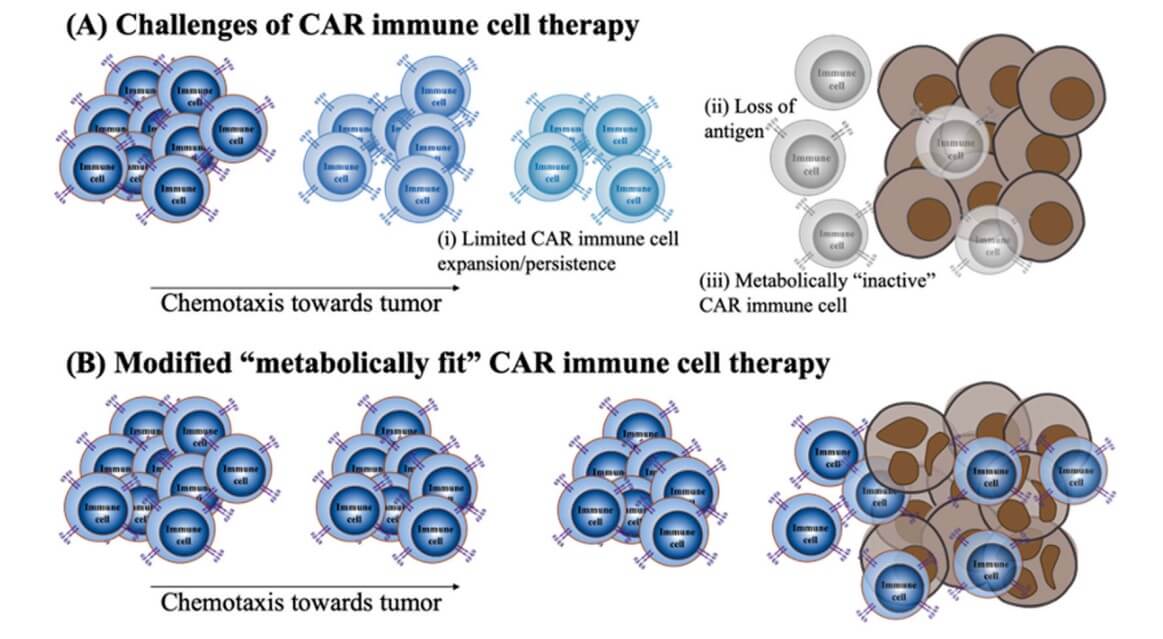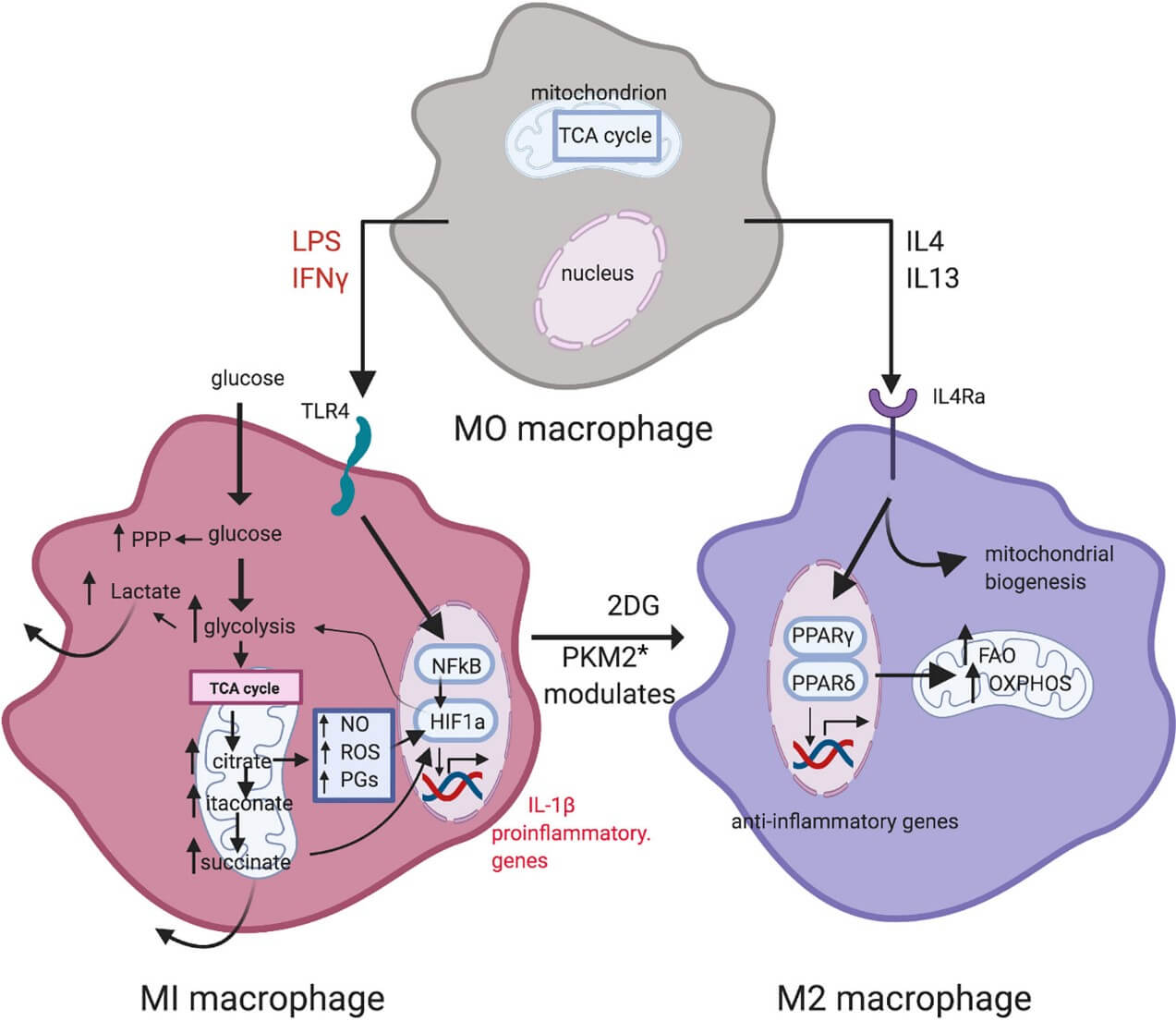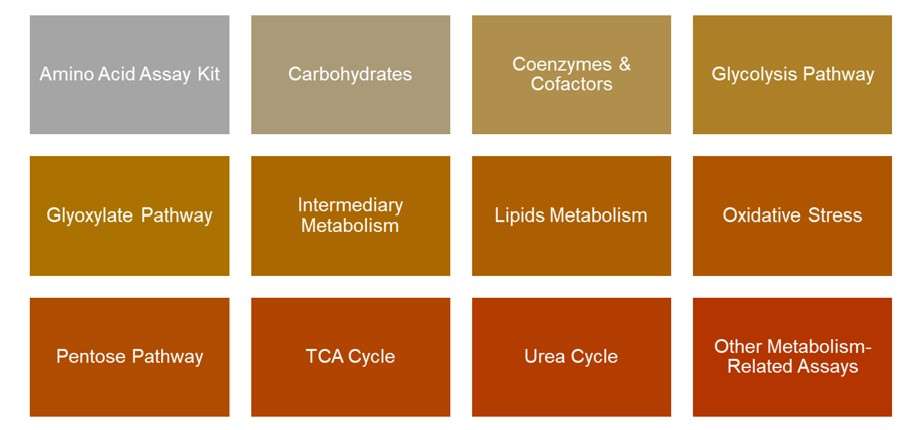Chimeric antigen receptor macrophage (CAR-MA) is a promising avenue of CAR cell-based immunotherapy and has the potential to overcome the shortcomings of CAR-T cell-based immunotherapies, especially in targeting solid tumors. However, the metabolic competition in the tumor microenvironment (TME) between cancer cells and immune cells remains a challenge. Bioengineering technologies, such as metabolic engineering, can make a substantial contribution when developing CAR cells to have an ability to overcome nutrient paucity in the solid TME. Creative Biolabs provides multiple immunometabolism analyses, including metabolomics services and various metabolism assays.
 Fig.1 Metabolically fit CAR cells need to be generated for effective CAR immunotherapy.1,3
Fig.1 Metabolically fit CAR cells need to be generated for effective CAR immunotherapy.1,3
Cellular metabolism plays a crucial role in the immune response and based on different stages of immune cell phenotype and their activation state, the metabolic properties of these cells will change. Immunometabolism encompasses the idea that changes in metabolism govern the phenotype of immune cells by controlling transcriptional and posttranscriptional events that are central to activation. Metabolic features of macrophages in response to environmental cues are associated with anti-inflammatory or pro-inflammatory phenotypes. Metabolism of M1 macrophages is characterized by enhanced glycolysis, flux through the pentose phosphate pathway (PPP), fatty acid synthesis, and a truncated tricarboxylic acid (TCA) cycle, leading to accumulation of succinate and citrate. The metabolic profile of M2 macrophages is defined by oxidative phosphorylation (OXPHOS), fatty acid oxidation pathway (FAO), decreased glycolysis, and PPP.
 Fig.2 Metabolic reprogramming in macrophage polarization.2,3
Fig.2 Metabolic reprogramming in macrophage polarization.2,3
Metabolomics is the comprehensive assessment of endogenous metabolites and attempts to systematically identify and quantify metabolites from a biological sample. Based on a comprehensive platform involving advanced instruments, including MS, GC-MS, LC-MS, NMR, and so on, we provide targeted and untargeted metabolomics service and metabolic flux analysis. At last, we deliver a precise and detailed data and analysis report.
Understanding the metabolic variations and possible outliers is thus a crucial aspect of disease-oriented research. Creative Biolabs provides a variety of metabolism assays kits to analyze metabolic products, enzymes, or pathways. These can be analyzed by fluorometry and/or colorimetry. Our assay kits allow you to analyze the pathways of metabolism in-depth in live cells, lysates, and biofluids with easy analysis on your plate reader.
 Fig.3 Our metabolism assays categories. (Creative Biolabs)
Fig.3 Our metabolism assays categories. (Creative Biolabs)
Creative Biolabs offers a wide variety of assays, proteins, and antibodies to facilitate your research in various areas of metabolism including lipid metabolism, amino acid metabolism, and carbohydrate metabolism. Please feel free to contact us for more information.
References
For any technical issues or product/service related questions, please leave your information below. Our team will contact you soon.
All products and services are For Research Use Only and CANNOT be used in the treatment or diagnosis of disease.
 NEWSLETTER
NEWSLETTER
The latest newsletter to introduce the latest breaking information, our site updates, field and other scientific news, important events, and insights from industry leaders
LEARN MORE NEWSLETTER NEW SOLUTION
NEW SOLUTION
CellRapeutics™ In Vivo Cell Engineering: One-stop in vivo T/B/NK cell and macrophage engineering services covering vectors construction to function verification.
LEARN MORE SOLUTION NOVEL TECHNOLOGY
NOVEL TECHNOLOGY
Silence™ CAR-T Cell: A novel platform to enhance CAR-T cell immunotherapy by combining RNAi technology to suppress genes that may impede CAR functionality.
LEARN MORE NOVEL TECHNOLOGY NEW SOLUTION
NEW SOLUTION
Canine CAR-T Therapy Development: From early target discovery, CAR design and construction, cell culture, and transfection, to in vitro and in vivo function validation.
LEARN MORE SOLUTION